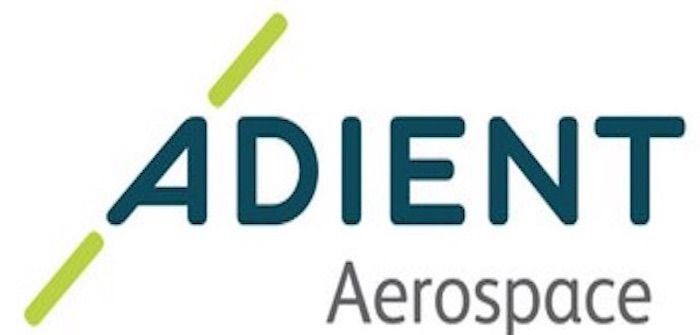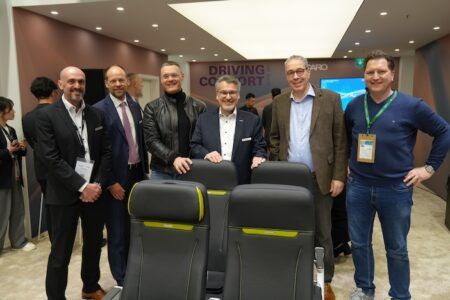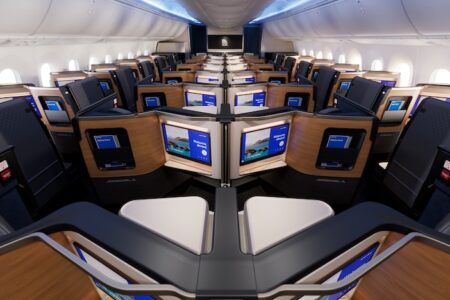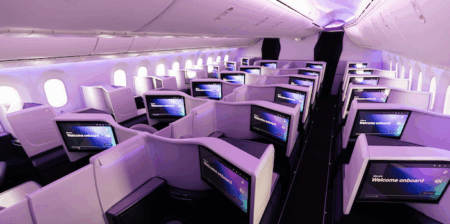Boeing is set to make waves in the aircraft seating market with the formation of Adient Aerospace, a joint venture with automotive seating giant, Adient. According to the partners (Adient is the majority stakeholder with a 50.01% share), Adient Aerospace will “develop, manufacture and sell a portfolio of seating products to airlines and aircraft leasing companies”.
These seating products will be available for line-fit and retrofit installation, and not just for Boeing aircraft – Adient Aerospace has indicated that they will be available for installation in the cabins of other commercial airplane manufacturers, which is good for product consistency across an airline fleet.
Who is Adient?
In March 2017 we announced Adient’s interest in the aircraft sector. While the name may be unfamiliar to some – it was only established in October 31, 2016 – its previous name of Johnson Controls Automotive Experience is very well known, having become a clear market leader in automotive seating over its 30 years of business, with nearly double the global market share of this $70 billion industry than its closest competitor. Indeed the chances are you have sat in an Adient product, as one in three automotive seats in the world are manufactured by the company, and even more contain Adient components.
Adient boasts 86,000 employees operating 237 manufacturing/assembly plants in 33 countries worldwide and owns every stage of its seat-making processes, from research and design all the way to engineering and manufacturing.
In short, Adient is worth paying attention to, especially as it is now widening its focus, with a goal of achieving US$1 billion in annual revenues from non-automotive markets over the next five years, a major element of which will be the Adient Aerospace joint venture. The commercial aircraft seating market is certainly compelling, with industry analysts forecasting the market to grow from approximately US$4.5 billion in 2017 to $6 billion by 2026.
Why does Boeing want a partnership?
There is no shortage of suppliers in the aircraft seating sector, so why has Boeing entered the venture? Boeing and Adient say that the venture “addresses the aviation industry’s needs for more capacity in the seating category, superior quality and reliable on-time performance”.
As Kevin Schemm, senior vice president of supply chain management, finance & business operations and CFO for Boeing Commercial Airplanes explained, “Seats have been a persistent challenge for our customers, the industry and Boeing, and we are taking action to help address constraints in the market.
“Adient Aerospace will leverage Boeing’s industry leadership and deep understanding of customer needs and technical requirements, to provide a superior seating product for airlines and passengers around the world. This joint venture supports Boeing’s vertical integration strategy to develop in-house capabilities and depth in key areas to offer better products, grow services and generate higher lifecycle value.”
Of course Adient Aerospace will benefit from parent company Adient’s automotive engineering and innovative expertise – and those of Boeing – as well as their shared expertise in managing complex, global supply chains.
“Adient has a strong set of transferable competencies that will offer a unique opportunity to create value for our company and for Boeing, our shareholders and the broader commercial aircraft market,” said Adient chairman and CEO, Bruce McDonald. “To enhance the customer experience for passengers, airlines and commercial airplane manufacturers, we will apply our unmatched expertise for comfort and craftsmanship along with our reputation for operational excellence.”
Adient Aerospace’s operational headquarters, technology center and initial production plant will be located in Kaiserslautern, Germany, near Frankfurt. The joint venture’s initial customer service center will be based in Seattle, USA. Adient Aerospace’s aftermarket spare parts distribution will be performed exclusively through Aviall, a wholly owned subsidiary of Boeing.





